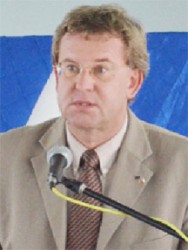Head of Delegation of the European Union in Guyana, Ambassador Robert Kopecký has said that the core of the Caribbean sustainability lies in its more profound economic, financial and even political cooperation.
He was speaking at a reception to commemorate Europe Day, last Thursday at his Bel Air Springs residence.
According to a release from the EU delegation, Kopecký said that this is the only way to rationalise the limited funds and how to build a common market for goods, capital and labour, generating the meaningfulness of creation of bigger and therefore more competitive companies within the region and attracting relevant competitors from the outside. He reminded that this is how the relentless global market economy of nowadays works.

Kopecký said that Europe Day – the 63rd anniversary of the Schuman Declaration – was an opportunity to celebrate the EU’s achievements in promoting democracy, human rights, peace and prosperity on the European continent and for these efforts, the EU had been awarded the 2012 Nobel Peace Prize.
He noted that even in today’s Europe, democracy is a constant work in progress; it needs to be valued and protected. They share a responsibility to safeguard democracy, not just in Europe, but around the world.
The ambassador said that the EU has made human rights the silver thread that runs through its foreign policy, assisting democratic transitions around the globe and helping oppressed minorities, social groups and NGOs to voice their concerns.
He said that by adopting a comprehensive approach to global challenges, the EU is able to bring under one umbrella all elements of their external action – diplomatic, political, development, humanitarian aid, trade as well as military training. This allows the EU to address all dimensions of a crisis and sow the seeds of deep democracy and prosperity. They are also tackling new challenges such as the freedom and security of cyber space, education, energy and water security and climate change.
Kopecký said that in order to safeguard its values, the EU needs strong partners. This is why it has strengthened its position at the UN and deepened relationships with strategic partners and regional organisations. He said that their experience in forging compromise among 27 countries with distinct cultures and histories has been an important asset also in working with partners like Guyana, Suriname or Caricom.
He noted that while the EU and Caricom have successfully, finalised the cooperation under the umbrella of the 10th European Development Fund from 2007 – 2013, they are at the same time focusing on the future. He disclosed that discussions are underway on the focus of bilateral cooperation with Guyana and Suriname as well as for increased regional cooperation for the next multiyear financial framework called 11th European Deve-lopment Fund (the last one under the current Cotonou agreement) to be implemented between 2014-2020.
Kopecký highlighted that the development cooperation and the diplomatic, political and trade relations between the EU and the Caribbean are guided by the Joint Caribbean – EU Partnership Strateg
adopted last November.
Its five priority areas are regional integration and cooperation in the wider Caribbean (including the European Union Member States’ Departments and the Over-seas Countries and Territories (OCTs); reconstruction of Haiti, climate change and mitigation of consequences of natural disasters; crime and security and joint actions in bi-regional and multilateral fora and on global issues.
He said this has created a solid base of a more structural partnership, as the future involves working together on areas of mutual challenge and opportunity.
He added that the interdependence of the two regions on the international political scene is obvious and is a very important element in maintaining the relationship.
Kopecký gave the example, of security, where they will be working very closely as transnational crime and its collateral effects are causing significant difficulties in both sub-regions. He also cited the latest example of a joint action being the ratification the Arms Trade Treaty at the UN.
Noting that his residence was completely flooded during the recent overtopping of the seawall by the Atlantic, the Ambassador said that event drove home how “important it is, in local circumstances, to properly maintain the drains, pumps and the whole kind of organism of the drainage system of the Guyanese coastal area”. He lauded the Guyana Mangrove Restoration Project as one of the most successful EU-funded projects. This project aims at restoring a natural sea defence barrier.





